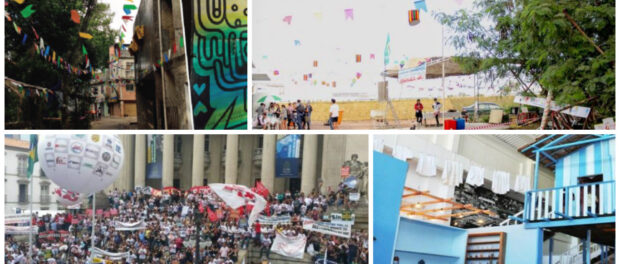
As the City of Rio races against the clock to finish final Olympics preparations, an increasing number of local and international voices are highlighting the human rights violations that cannot be allowed to be swept out of sight. To help our readers digest the major news and themes of the past month, we’ve summarized the stories we published here on RioOnWatch along with a few other must-reads in the media on favelas. Access past monthly summaries here and full digests here.
As the countdown to the Olympic Games continues, Amnesty International has documented a spike in police killings, favelas like City of God undergo constant police operations, and some favela journalists call fervently for an end to the Pacifying Police Units in favelas. The economic crisis means social rent for communities that still await promised housing has dried up and public school teacher remain on strike while wages have not increased since 2014. A new book highlights how Guanabara Bay pollution impacts local communities, while a steel plant is causing environmental and health risks in the West Zone. The Popular Committee for the World Cup and Olympics is in the midst of a campaign to highlight the pervasiveness of human rights abuses like these in pre-Olympics Rio.
One key theme that emerges is the municipal government’s effort to cleanse the city of the poor in time for the Games. Vox produced a must-see video examining this trend with a focus on Vila Autódromo, where the Evictions Museum and a traditional Festa Junina celebration kept the community’s world-renowned spirit of resistance strong this month. Zacarias, a fishing community facing eviction, also celebrated its resistance with a Festa Junina party.
‘Cleansing the city’ in pre-Olympic Rio has also been reflected in a hightening criminalization of sex workers, neglect of Afro-Brazilian history in Little Africa in the Port area, and continued threats to uplifting community museums like the Museu da Maré.
Olympics-boosted gentrification is further displacing the poor, as The Guardian highlighted this month. In Vidigal, which just held its second election for the Residents’ Association since the UPP arrived, popular local artist Wilson Alexandre was recently evicted due to real estate speculation.
Further exacerbating the city’s spatial inequality is the growth of gated communities, compounds that provide high security to those who can afford them. In turn, the favela Asa Branca, near the Olympic Park, is installing its own cameras amid growing perceptions of insecurity.
Housing expert Raquel Rolnik predicts Brazil’s interim government will continue the kind of development trends seen in Olympic preparations, and the political transition raises concerns about the fate of favela investment programs like PAC in Rocinha. Meanwhile, communities evicted from favelas to public housing for the Olympics are increasingly going public with stories of the failure and unmet promises of the public housing system.
Alemão resident Cleber Araújo argues the impeachment process has revealed traditional Brazilian media’s weaknesses, now that alternative and international media are more accessible. Just this month, favela journalists lectured at a university and spoke with Rocinha residents about the importance of community communication.
In the meantime favelas continue organizing creatively. A new YouTube channel and blog counters stereotypes by documenting favela residents traveling to different countries. One of Rio’s most violent favelas, Chapadão, hosted its first literary festival. Ecotourism is gaining ground in Vila Laboriaux. And finally, Vale Encantado’s biodigester was among several innovative urban health solutions presented at a Design Challenge that could benefit Rio favelas.
We also published the first in a series of stories exploring how favela residents build their homes. The ingenuity and resourcefulness that accompanies informality in communities is an asset that must be valued in any urban planning project, as RioOnWatch editor Theresa Williamson describes in an exclusive in-depth interview with Guernica Magazine. Williamson was also interviewed for a podcast in Americas Quarterly this month, as well as featured in videos on Vox and USA Today.
Look out for our next summary of articles from July, the final month before the Rio 2016 Olympics. For more information and links to favela news from the month, see our full Favela Digest for June 2016 here. You can subscribe to receive the Favela Digest straight to your inbox each month here.
